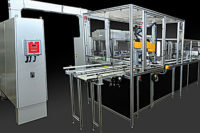Power Solutions International (PSI) of Wood Dale, IL, designs, engineers and manufactures engines for the industrial, construction, agricultural and on-road markets. To improve traceability during manufacturing, PSI needed a way to track an engine block through the production process.
“We knew we needed to add this step to our process as a future potential cost saving measure,” says Ryan King, chief information officer at PSI. If an engine fails in the field, having a record of the production process makes finding errors easier so they can be corrected efficiently with minimal downtime.
Finding a solution that would allow for easy traceability and implementation while surviving the manufacturing process proved to be difficult—during the production process, the engine blocks go through six wash-down cycles, are bombarded with metal chips and are exposed to harsh chemicals. This means that any identification mark needs to survive extremely harsh environments.
“One solution that we looked into was routing a hole into the engine block and using RFID bolts, but the equipment we would need to do that, and the time and money it would take to manage that was too much,” says King. The solution also needed to be easy to implement and flexible enough to be adaptable to any changes that could happen in the production process.
After multiple visits to the facility, representatives from the research and development department at Brady thought of a solution that would meet the unique needs at PSI. The Brady team suggested their B-855 Toughwash label material that could withstand the brutality. The Toughwash material is specifically designed to withstand multiple wash-down cycles in the food and beverage industry while maintaining excellent clarity and adhesion.
To make the implementation simple, printers from Brady were brought in so the label could be easily printed onsite as part of the manufacturing process. Brady suggested printing a 2D barcode on the label so it could be scanned at each manufacturing point to record the date and time the work was done, the employee working on it and the machine that was used to do the work. A spot on the engine block was then routered out and the label was placed at the beginning of the manufacturing process.
After thorough testing, the Toughwash label was able to survive the manufacturing process and was officially added as the step PSI needed for traceability in the manufacturing process.
“It stays stuck,” says King. “It does what Brady said it would do and was easy for us to implement.”
PSI is looking to possibly extend this technology to other areas of manufacturing in the future. Because the process was successful, Brady has been tapped to get involved in other labeling projects for PSI, including a new emissions label.
For more information on product labels call 888-272-3946 or visit www.bradyID.com.


